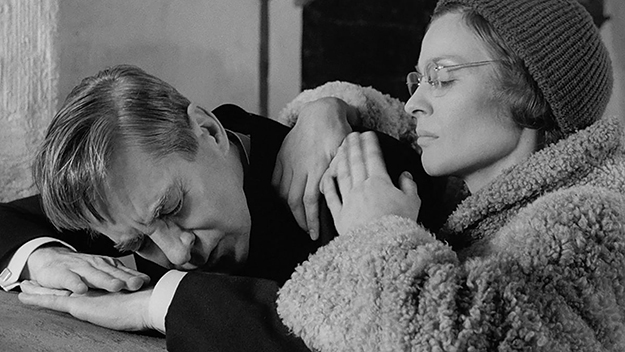Seeing Double: Bad Timing & Winter Light
Seeing Double is a new column in which our favorite critics write about unlikely movie pairings. This article appeared in the June 10 edition of The Film Comment Letter, our free weekly newsletter featuring original film criticism and writing. Sign up for the Letter here.

Winter Light (Ingmar Bergman, 1963)
Last summer, two films came together for me by purest coincidence: I caught Ben Sinclair’s Criterion video in which he discusses the films he loves, and received the dispiriting news of the death of Max von Sydow. Of the Sinclair faves I chose Bad Timing (1980), a Nicholas Roeg film I’d never seen. Labeled by Rank, its distributor, as “a sick film for sick people,” and X-rated in its limited American release, the film tells the lurid story of a psychiatrist (Art Garfunkel) obsessed with a neurotic woman (Theresa Russell) he loves and tortures (and is tortured by), until finally he rapes her comatose body after she tries to kill herself. A hardly less creepy Harvey Keitel plays a police detective trying to get to the bottom of the hideous scene of desecration—or is he trying to experience the defilement vicariously? The exquisitely apt setting is a seething and shape-shifting Vienna after the Soviet withdrawal, with reverberations of the shimmering twistedness of Klimt and Schiele (whose paintings are displayed in the film), the sexual neuroses unearthed by Schnitzler and Freud, and, of course, the labyrinthine corruptions of Carol Reed’s The Third Man. It’s a place where espionage and voyeurism blend into one another, in a way that seems made to order for Roeg’s surprising juxtapositions.
Garfunkel and the very young Russell are intrepid, subjecting not just their bodies but also their psyches to harsh exposure. A similar daring in the revelation of ugly psychic truths animates Gunnar Björnstrand and Ingrid Thulin in Ingmar Bergman’s Winter Light (1963). I wanted something bleak, and had recently watched Hour of the Wolf (1968), so I ended up with a movie in which von Sydow has only a secondary part. At least Hour of the Wolf provides imaginative escapes: Winter Light is situated in a desolate and barely populated northern parish, where the cold orb of the sun grudgingly peers through grim skies. (Sven Nykvist’s cinematography—an infinity of grays with the occasional gentle nimbus—has never been more expressive.) Björnstrand plays Tomas, a rural pastor so incapacitated by his loss of faith that he can’t even comfort a distressed parishioner (von Sydow) who is clearly headed for suicide. Not only that, when Ingrid Thulin’s Märta, the schoolteacher who loves Tomas, tries to assuage his angst, he reacts not just with indifference (wounding enough on its own) but also with revulsion.
What was uncanny was the way the two films aligned in their unvarnished depiction of the darkest, most cringe-inducing aspects of misogyny—rape and necrophilia on the one hand, and on the other, bottomless loathing. That both men’s actions spring from self-hatred does nothing to diminish the power of the animus projected outward. If the rape scene in Bad Timing, blunt and graphic, is horrifying, no less chilling is Tomas’s quiet verbal assault in Winter Light. Tired of Märta’s fussing over him, providing cold remedies even as she herself wheezes into a handkerchief, he finally explodes—but ever so quietly. In a monologue that takes your breath away, he itemizes all the ways he dislikes Märta: her fretting, her mimicking his dead wife, her clumsy hands and physical problems (poor digestion, rashes, periods). The rant isn’t entirely undeserved. There’s a darkly comic aspect to the fact that Bergman, always ambivalent about women’s motherliness, has Thulin play Märta as a near caricature of a dowdy spinster, groveling in her desperation, cloying in her attentiveness.
When Märta asks Tomas why he hasn’t told her all this before, he replies that it’s because of his upbringing: he was taught to regard women as “of a higher order.” This—the ugly tirade in Winter Light, the rape in Bad Timing—is what happens when civilization breaks down and the veneer of reverence for women shatters. The loss of God, of belief, forms a thread through most of Bergman’s work, but here, in a man’s refusal not just of the comfort of religion but also of human warmth, is as close to utter despair as it gets. There is no catharsis of a conventional kind in either film, yet I came out exhilarated rather than depressed, stunned at the way these two directors and their actors look straight at appalling primal emotions without alibi, without euphemism.
Molly Haskell has written for many publications, including The Village Voice, The New York Times, Ms., Saturday Review, and Vogue. She is the author of Steven Spielberg: A Life in Films and From Reverence to Rape: The Treatment of Women in the Movies.







